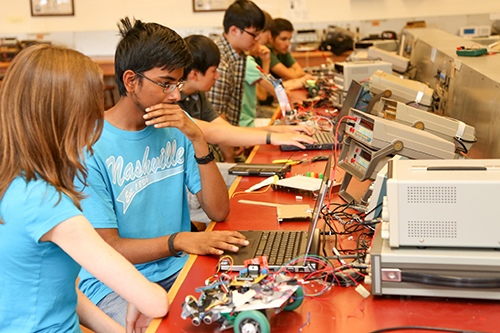Students exploring what U of T Engineering has to offer at DEEP Summer Academy (Photo: Faculty of Applied Science and Engineering, U of T)
How old were you when you realized you wanted to be an engineer? What experiences in your life shaped your decision to come to U of T Engineering?
Offered in the summer months over four weeks, the Faculty’s Da Vinci Engineering Enrichment Program (DEEP) lets high school students with an aptitude for science and math get a sneak peak of Skule before they even apply. Taught by graduate students in the Faculty, DEEP provides young people from around the world with the opportunity for advanced study in a variety of engineering, technology, business and science disciplines.
We sat down with DEEP instructor Patricia Sheridan (BASc 0T9, MASc 1T1) and asked her a few questions about her students. Patricia is currently pursuing her PhD in Engineering Leadership Education with ILead, investigating new methods of teaching effective teamwork and leadership skills through engineering design team projects. What’s more, she is a DEEP alum, giving her a unique perspective on the experience from both sides.
The DEEP course you teach, “Leading Engineering Innovation: Strategies for Success,” guides high school students through developing their team and self-leadership skills. Why do you think these skills are important for engineers, especially ones that are just beginning their engineering education?
We live in a highly interconnected world where the challenges that engineers will face are larger, more complex, and have significant social impact. It is important for them to know what is important to them as individuals, and as engineers, and what their personal value proposition is moving forward to sell themselves, and to know what they want to work on.
Focusing these students early on at trying to find an area at the intersection of their skills and passions will give them a great head start at knowing what they want to do and who they want to get on their team to work with them.
Maclean’s recently ran a story on “Generation Z” and how they are different from Millennials, who came before them. Would you agree with their outlook that Generation Z is the most ambitious yet? What leadership strengths have you seen in the DEEP cohort this summer?
The students are so mature, intelligent, and self-aware that it is very rewarding to work with them. The amount of energy and passion they have for what they are interested in has really stood out to me. Many have stayed back to finish conversations that were started in class, or to ask more questions about the topics or Engineering at U of T. The questions they have asked have been very thoughtful, and demonstrate both an interest in the subject matter and in the value that my answer can provide them.
As a DEEP alum, can you share with us how the program helped you as a young engineer?
It was important for me to get involved in DEEP as it was in instrumental part of my decision to come to U of T when I was a high school student. Participating in DEEP gave me the opportunity to see the campus, see the types of students and professors that are here, and gave me a feel of whether I would fit into the environment or not.
I think having this type of opportunity to experience first-hand what a brochure cannot fully capture is an essential part of gathering all the information needed to make an informed decision about which program and which university to attend.
When I participated in DEEP I saw a high caliber of intellectual, fun-loving and sociable people that I felt I would fit right in with, and, I have, since I came to this university.
What advice do you have for young (future) engineers?
Go out and try new things—you have to see how they feel to know if they work for you!
Be open to ambiguity, not getting an answer, or not finding a right answer. The world is not a binary place of right and wrong like high school tests. Find out more about yourself, find out what matters to you, and find ways to live in that space and embrace the ambiguity of the parts you don’t know.
For more information on DEEP Summer Academy, please visit the Engineering Outreach website.

